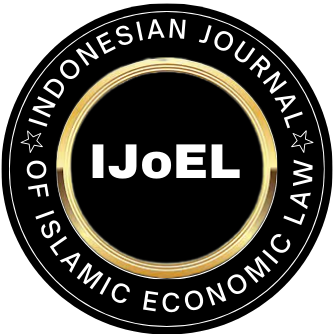Best Practice Review: Enhancing the Quality of Shariah Economist Scholars
DOI:
https://doi.org/10.23917/ijoel.v1i1.3433Keywords:
Ulama, Sharia Industry, Quality Human Resources, Best Practice ReviewAbstract
This research aims to overcome important gaps in the development of Islamic economic scholars' human resources (HR), including limited understanding of Fiqh Muamalah, unclear profiles of graduates, and lack of linkages with the Islamic industry. The implications of current conditions include the quality of Islamic products and services, the sustainability of industry growth, and the relevance of graduates. This research will provide guidance and best practice strategies to connect graduate profiles with the dynamics of the sharia industry, strengthen the human resources of sharia economic scholars, and support the development of a better sharia industry.
Downloads
References
Arif, M. Nur Rianto Al (2019). Market Share, Concentration Ratio and Profitability: Evidence from Indonesian Islamic Banking Industry. Journal of Central Banking Theory and Practice, 8 (2), 189-201, https://doi.org/10.2478/jcbtp-2019-0020
Auda, J (2022). Maqasid Methodology for Re-Envisioning Islamic Higher Education. Journal of Contemporary Maqasid Studies, jour-nal.maqasid.org, https://journal.maqasid.org/index.php/jcms/article/view/58
Billah, M.M.S. (2021). Islamic wealth and the SDGs: Global strategies for socio-economic impact. Islamic Wealth and the SDGs: Global Strate-gies for Socio-Economic Impact, 1-646, https://doi.org/10.1007/978-3-030-65313-2
Darmalaksana, W. (2022). The need for social theology to strengthen the social functions of Islamic banking in Indonesia. HTS Teologiese Studies / Theological Studies, 78 (1), https://doi.org/10.4102/hts.v78i1.7342
El-Tobgui, C.S. (2023). Reviews The Anthropology of Islamic Law: Edu-cation, Ethics, and Legal Interpretation at Egypt's Al-Azhar. Journal of the American Oriental Society, 143(1), 217-219, https://doi.org/10.7817/jaos.143.1.2023.r0001
Farooq, M.O. (2013). Contemporary Islamic Economic Thought. Con-temporary Islamic Finance: Innovations, Applications, and Best Prac-tices, 17-37, <https://doi.org/10.1002/9781118653814.ch2>
Ghamry, S. (2022). Factors influencing customer switching behaviour in Islamic banks: evidence from Kuwait. Journal of Islamic Marketing, 13(3), 688-716, https://doi.org/10.1108/JIMA-01-2020-0021
Hassan, M.K. (2023). Sharia governance standards and the role of AAOIFI: a comprehensive literature review and future research agen-da. Journal of Islamic Accounting and Business Research, 14 (5), 677-698, https://doi.org/10.1108/JIABR-04-2022-0111
Hosen, M.N. (2021). Perception and expectation of customers from an Islamic bank perspective. Journal of Islamic Marketing, 12(1), 1-19, ISSN 1759-0833, https://doi.org/10.1108/JIMA-12-2018-0235
Islam, Tazul (2022). Expansion Of Maqasid Thought Beyond Maqasid Al-Shariah: Maqasid Al-Quran As A New Paradigm. Hamdard Islami-cus, 45 (4), Hamdard Foundation Pakistan, https://doi.org/10.57144/hi.v45i4.514
Isman, et.al, (2023). Empirical Legal Research based on Jasser Auda's Maqashid Syariah Theory. al-Afkar Journal,
Isman, I, & Yahya, Y (2022). Istiqra al-manwi; multicultural judicial rea-soning. Ijtihad: Jurnal Wacana Hukum Islam dan Kemanusiaan, https://ijtihad.iainsalatiga.ac.id/index.php/ijtihad/article/view/7434
Isman, I. (2020). Legal Reasoning Comparative Model Of Asy Syatibi And Gustav Radbruch. Nurani: Jurnal Kajian Syari'ah Dan Masyara-kat, 20 (1), 49-56. https://doi.org/https://doi.org/10.19109/nurani.v20i1.6089
Janah, N. (2020). The intention of religious leaders to use Islamic bank-ing services: the case of Indonesia. Journal of Islamic Marketing, 12(9), 1786-1800, https://doi.org/10.1108/JIMA-01-2020-0012;
Kultsum, U. (2022). Comparative studies between public and private Is-lamic schools in the era of globalization. International Journal of Evaluation and Research in Education, 11(1), 421-430, https://doi.org/10.11591/ijere.v11i1.22182
KUZULU, Özcan (2023). Homo Islamus and Its Reflections in Islamic Economics. TroyAcademy, 8(2), 235-261, ISSN 2718-0905, Canak-kale Onsekiz Mart University, https://doi.org/10.31454/troyacademy.1241585
Mahyudi, M. (2019). Islamic economics as an integrated social science: Novel ideas on its foundations. Methodology of Islamic Economics: Problems and Solutions, 134-158, https://doi.org/10.4324/9780429320804-6
Mukhibad, H. (2022). Shariah supervisory board attributes and corporate risk-taking in Islamic banks. Cogent Business and Management, 9 (1), https://doi.org/10.1080/23311975.2022.2158607
Othman, B. (2016). The potential of ASEAN in halal certification imple-mentation: A review. Pertanika Journal of Social Sciences and Hu-manities, 24 (1), pp: 1-24,
Sholihin, Muhammad, Sugiyanto, Catur, & Susamto, Akhmad Akbar (2023). A systematic review on homo Islamicus: classification and cri-tique. Islamic Economic Studies, Emerald, https://doi.org/10.1108/ies-11-2022-0043
Slycken, J. Van der (2020). A Conceptual Exploration and Critical In-quiry into the Theoretical Foundation(s) of Economic Welfare Measures. Ecological Economics, 176, https://doi.org/10.1016/j.ecolecon.2020.106753
Usman, H. (2022). The exploration role of Sharia compliance in the technology acceptance model for e-banking (case: Islamic bank in In-donesia). Journal of Islamic Marketing, 13(5), 1089-1110, https://doi.org/10.1108/JIMA-08-2020-0230
Zuhri, H., & Arif, Muhammad (2023). Al-Ghazalī (1058-1111) In The Eyes Of Contemporary Indonesian Muslim Intellectuals. Hamdard Is-lamicus, 46 (1), Hamdard Foundation Pakistan, https://doi.org/10.57144/hi.v46i1.512
Downloads
Submitted
Published
How to Cite
Issue
Section
License
Copyright (c) 2023 Jaih Mubarak, Shaifurrokhman Mahfudz

This work is licensed under a Creative Commons Attribution 4.0 International License.






